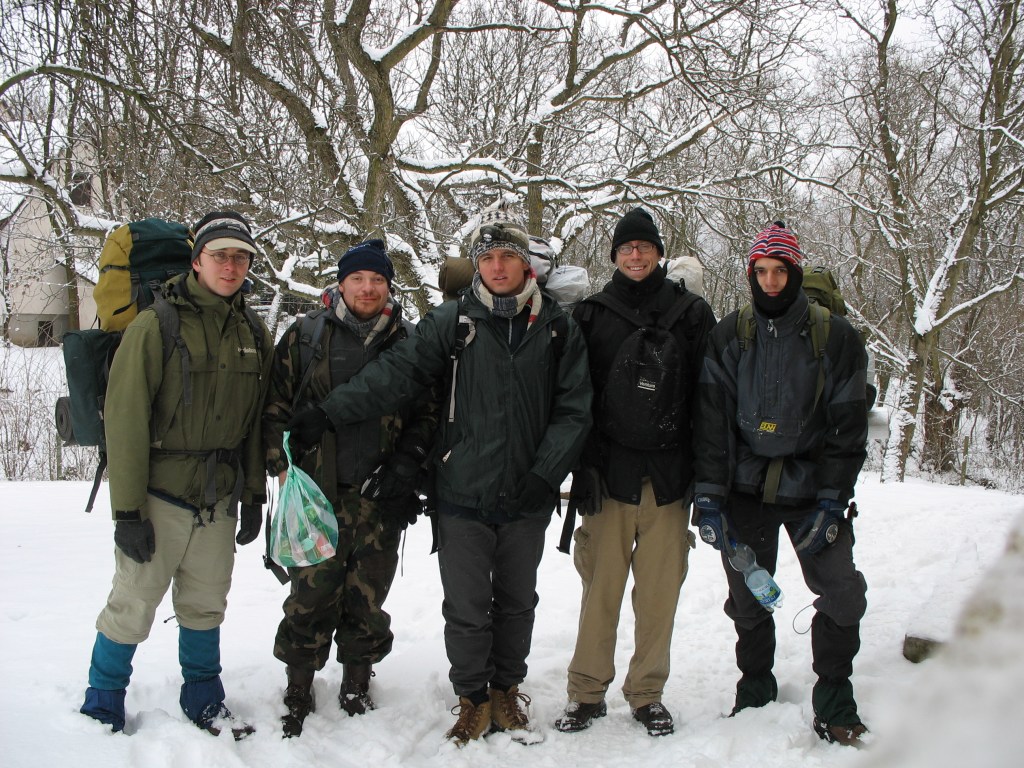If you were to find yourself in the Zemplen Hills of northeastern Hungary on the night of December 27th, 2005, you would likely have stumbled upon an equally stumbling group of four Hungarians and one hapless American, all of whom had not a clue as to where they were.
I was the American. To say that I was only hapless would be an understatement. So exhausted, so disoriented, so cold, so wet, so worried was I that I’d finally come to the conclusion that our only way out of the wilderness this night was to call the Hungarian version of Search and Rescue. It would work, it really could. We had cell phone power and range…all we had to do was make the call. I looked to Zoltan, my friend and the leader of this expedition, and half-jokingly suggested we call it a night and send for the copters. To this Zoltan replied that the only reason we’d have for calling Search and Rescue would be if one of us broke his leg. (I looked around for a sizable, suitable rock but all of them were buried well under the snow.)
I cornered him again. “Zoltan,” I said. “What’s the point of all this?”
“The point,” he said, “is to have fun.”
The previous day Zoltan and I had taken the train from Szolnok, an industrial city on the central Great Hungarian Plain, to Szerencs, the village that would serve as our jumping off point to the Zemplen Hills. I’d been visiting Zoltan and his family for Christmas, and for the past few days I’d been eating well, really well, mostly Zoltan’s mother’s cooking. Just before booking it to Szerencs, I’d partaken in Zoltan’s grandmother’s cooking—even more good grub like stuffed cabbage and plenty of sweets. “You should fill up on this food,” Zoltan said. “You’ll miss it when we are starving in the mountains.”
We arrived at the Szerencs train station around nine at night on December 26th. Zoltan and I immediately staked out our seats in the waiting room and started gearing up for the hike. We made sure the weight was properly proportioned throughout our packs, meaning the heaviest weight (the cans of food) went at the very bottom so as to take the pressure off our shoulders and instead place it on our hips. Zoltan prepared his headlamp; at this point I was oblivious to its purpose. He stuffed his power bars in all the available corners and crevices of his pack while I tried to fit a two-season-quality sleeping bag (“Two-season,” Zoltan laughed when he first saw it. “That means spring and summer.”) into my pack and cinch a foam bedroll to the back. At one point Zoltan went outside to see if the others had arrived yet. Within moments he’d returned.
“Remember,” Zoltan said. “He who dares, wins.”
At around 9:30 Zoltan’s friends—Adam, Roland and Attila—showed up at the station. All three were Hungarian, and all three were prepared to hike. From the station we took Attila’s car to the house of an old couple, friends of Attila. The husband and wife welcomed us into their beautiful, over-a-hundred- year-old home and gave us snacks. The wife poured us each a shot of some clear liquor (“Venom,” Zoltan called it) and then we toasted—to the hiking trip, I think. Then she poured us all another round which we of course could not refuse. The second time we toasted to, I think, the house. Or maybe it was to the New Year. Everything said was in Hungarian of course, with the occasional translation from Zoltan.
The old couple was expecting us to stay the night and take off hiking early the next morning. But Zoltan shook his head. We were leaving that night. By now it was 10:30 and very, very dark outside. I looked out the window and then looked at the rooms beckoning us to bed. I know where I’d have headed had I been the leader of this expedition. Zoltan would later say to me, “We didn’t go all the way to this part of Hungary to sleep in beds. We came here to hike.”
I knew Zoltan from my days as a college student. For almost two consecutive years we’d shared the same apartment close to campus. We’d played basketball together, lifted weights together, partied together, watched sitcoms together. And now we were about to hike together. More than a month before Christmas, Zoltan had sent me an email detailing all that I would need to make the hike a happy and successful one. All the gear I’d need right down to the mindset. Apparently I hadn’t read that email carefully enough. Ten-thirty at night? I thought. Who goes hiking at ten-thirty at night?
The Hungarians, that’s who. There was no turning back once we set off from the elderly couple’s house at, that’s right, ten-thirty. None of us had tents, only sleeping bags and foam mats to stave off the cold on the ground when we did finally find a place to sleep. We were looking for the ruins of a castle on a hill far off in the distance. We could see it (sort of). We just couldn’t get to it that night. We must have crossed (and, for some of us, fallen into) at least seven streams we didn’t at first see because they were covered with snow. Even Roland, a usually reserved and macho guy, laughed at his own expense when he took a dive head-first into the snow, one of his feet stuck through the ice behind him. At three in the morning we made it to the village of Telkibanya and there collapsed on the side of a house. At least it wasn’t snowing. But the wind blew something fierce against our sleeping bags and faces.
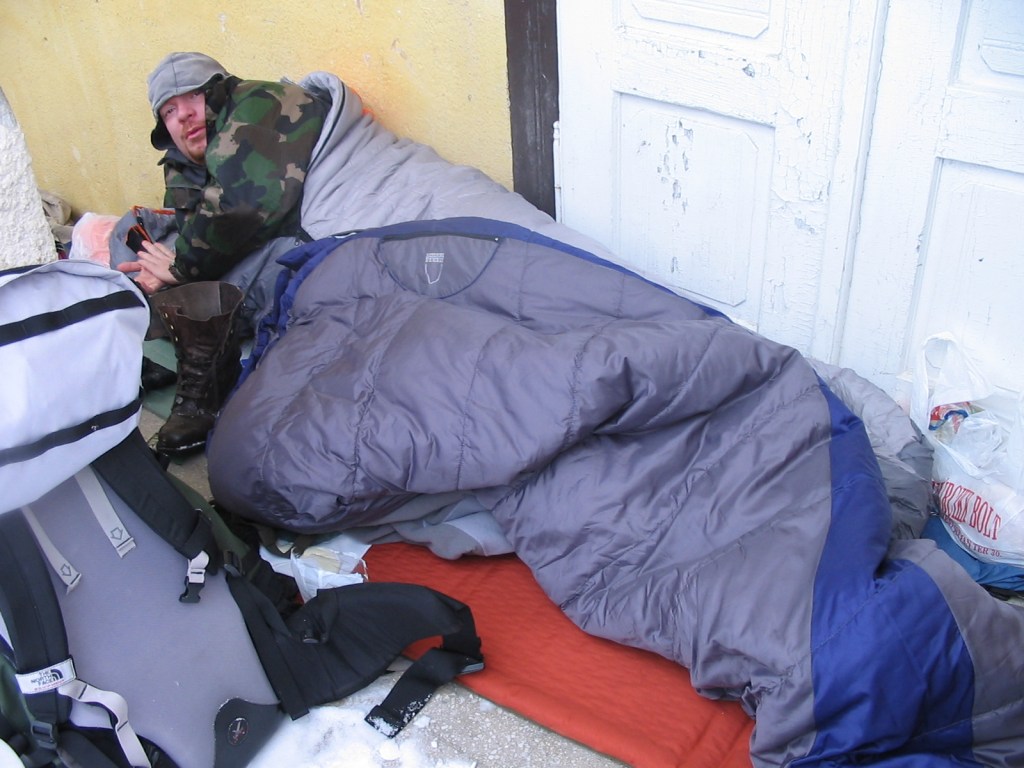
The next morning a villager, an old man, approached us just as we got up. He looked at us, looked into the sky and said (in Hungarian), “Wasn’t it cold?”
It was very cold. And it was only going to get colder. After passing around the big bottle of Becherovka, a sweet ginger-flavored Czech liquor, we set off for the castle ruins. This second day it was snowing heavily. The snow never really stopped that day. We made it to the ruins of the castle, Eszaki Bastya, which had undergone a renovation a few years back. The setting—with the wind whipping the snow up in swirls, the Hungarian flag flying proudly overhead, the valley spread out before us like a new world—was spectacular.
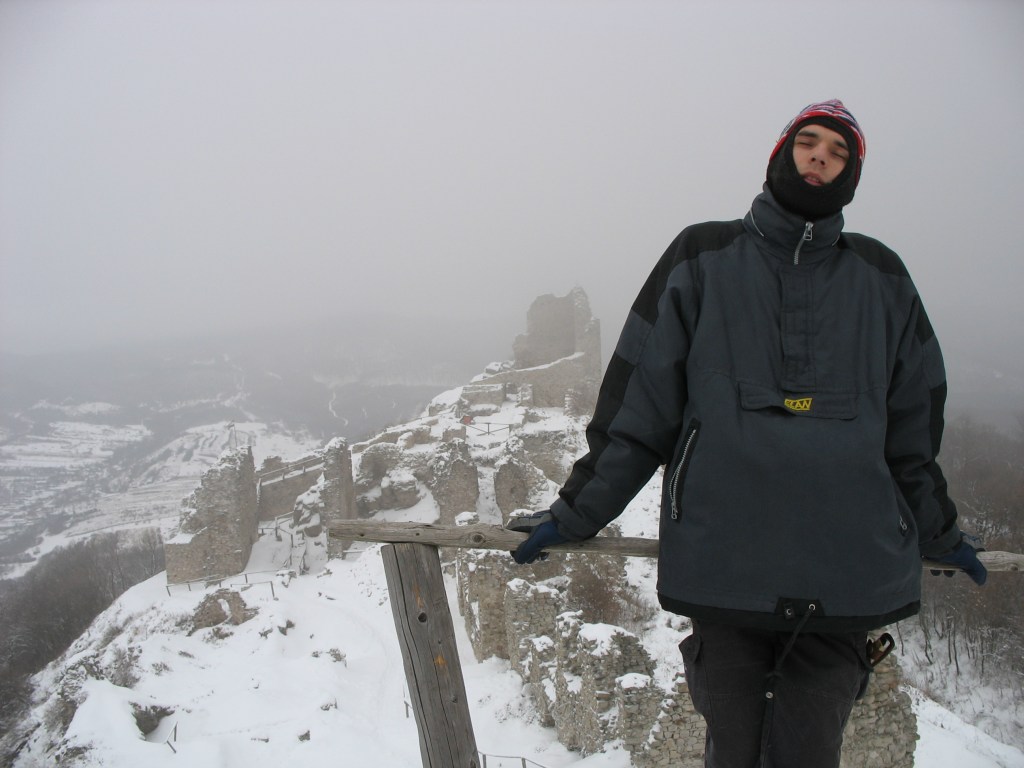
From the ruins we hiked several miles south to the village of Kerekkoto and found the only pub open in town. For the equivalent of a few U.S. dollars we imbibed in hot tea and beer and ate much of the food from our own packs.
After we’d finished eating Zoltan spread his map of the Zemplen Hills across the table. Strewn about the map like so many gravestones were little orange sticky arrows each representing a place we had to reach by the end of the two-day journey. I counted approximately twenty stickies—no small task even for four Hungarians who’d been doing this kind of thing together every year for the past ten years. And even though the last point, the pinnacle, the goal de resistance was a mountain, and the mountain was only 3,300 feet high, I couldn’t see how we’d reach it given only two days.
It was about 4:30 in the afternoon on this, the second day, and I was thinking, Why don’t we stay here in this village for the night? But I knew Zoltan and his friends had other plans so I didn’t even bother bringing up my idea. Zoltan made it clear before I came to Budapest that when we hike we hike together, lockstep in every decision.
We set off from Kerekkoto just as the sun went down. The snowfall was incredibly heavy now and we were hiking up a long trail into the wilderness.
We were looking for a stone hut that one of the villagers in the pub had told us about. The hut was where we planned to sleep on our second and last night. The idea of making it to the mountain was by this time well out of even Zoltan’s mind. The only thing concerning us now was finding a safe place to sleep.
We were guided by markers painted on trees. A white- and red-striped flag meant we were going the right way. A red arrow pointed the opposite direction meant we were headed the wrong way. Unfortunately, for every flag we saw we next encountered three arrows directing us back the way we came. Soon enough we were lost. Even Zoltan had to admit this. When in exasperation I pointed out to him that Americans just don’t hike at night his answer was “The difference between Americans and Hungarians is that Americans hike for ten hours, get lost, give up and die. Hungarians hike for ten hours, even at night, and when they get lost they hike another ten hours until they find a place to sleep.”
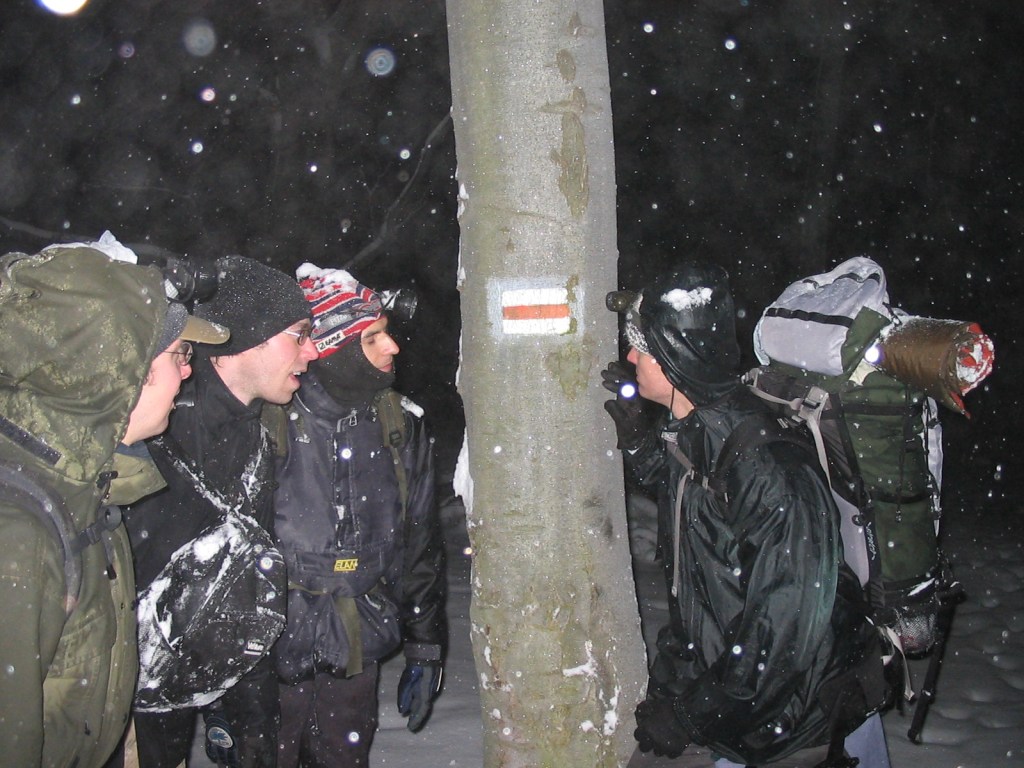
For a good deal of that second night I was left alone on the trail standing in too-deep snow and holding a flashlight up to my face while snowflakes collected on my glasses and my fellow hikers went off into the woods to look for a stone hut or a flag on a tree. Lucky for them they had headlamps to light the way. Still, the night couldn’t help but be punctuated with Hungarian expletives like “Baszd meg!” and “Faszszopo!”
Finally, after five hours of stumbling up and down hills (I thought I saw a marker way up there, let’s go!), clutching onto branches and slipping in the wild wet, we encountered two, then three flags in a row. The stone hut was long gone. Perhaps it no longer (never?) existed. What we did find though were two large wooden huts containing bales of hay. These huts we broke into with Attila’s axe and dragged out the bales on the top to make room for our sleeping bags. And that’s how we spent our second and final night of the hiking trip.
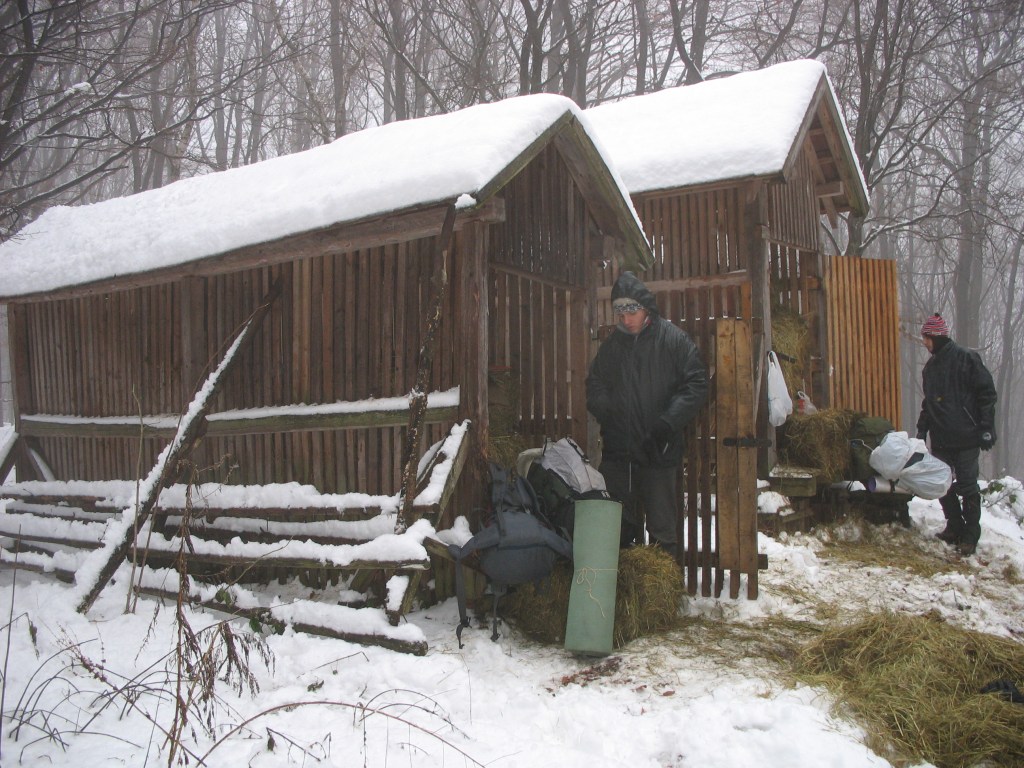
But they were warm. Were those huts and that hay ever warm. Much warmer than the side of the house that first night.
The third day it was raining, but we didn’t mind as we were on our way out. We hiked to the nearest village, Regec, at the southern end of the Zemplen Hills. In Regec we couldn’t find a ride so we hiked to Fony, the next village six miles to the west, and there found a ride for Attila who came back with the car. Our adventure was over.
